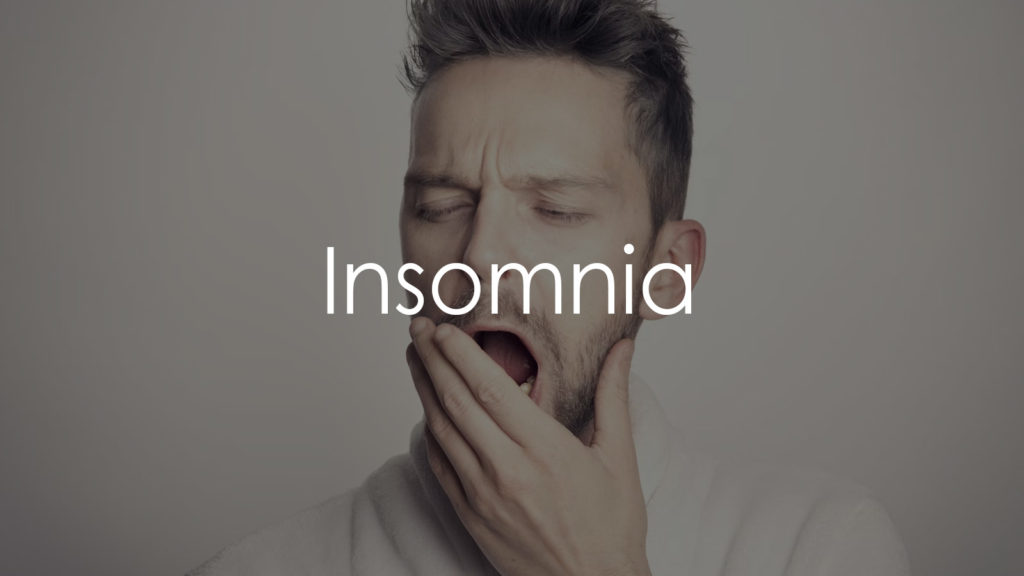Insomnia can be categorized as either acute, lasting for days or weeks and often triggered by stress or a specific event, or chronic, persisting for a month or more and frequently linked to underlying factors or health conditions. The impact of insomnia extends beyond simple tiredness, affecting overall quality of life and well-being.

Causes and Possible Diseases
Several factors and conditions can contribute to insomnia, including:
- Psychological Issues
- Stress, anxiety, and depression are among the most common causes of both acute and chronic insomnia.
- Lifestyle Factors
- Irregular sleep schedules, napping, stimulating activities before bedtime, and an uncomfortable sleep environment can disrupt sleep patterns.
- Diet and Substance Use
- Consumption of caffeine, nicotine, alcohol, and heavy meals close to bedtime can interfere with sleep.
- Medications
- Certain medications, including some antidepressants, hypertension drugs, and stimulants, can lead to insomnia.
- Health Conditions
- Chronic pain, asthma, diabetes, neurological disorders, and hormonal changes (such as those occurring during menopause) can cause insomnia.
- Sleep Disorders
- Other sleep disorders, including sleep apnea and restless legs syndrome, may lead to insomnia.
When to See a Doctor?
Consider seeking medical advice if:
- Persistent Insomnia
- If insomnia persists for more than a few weeks without improvement, professional evaluation may be necessary.
- Daytime Impairment
- When insomnia leads to significant daytime fatigue, mood changes, difficulty concentrating, or impaired daily functioning.
- Health Concerns
- If there are concerns that an underlying health condition or medication might be contributing to sleep disturbances.
- Dependence on Sleep Aids
- If over-the-counter or prescription sleep aids are regularly needed to fall asleep, or if these aids no longer seem effective.
- Emotional Distress
- When stress, anxiety, or depression are suspected to be linked to insomnia or if insomnia exacerbates these conditions.
Professional evaluation typically involves a thorough medical history, a review of sleep habits, and possibly diagnostic tests to identify any underlying conditions. Treatment for insomnia may include lifestyle modifications, cognitive-behavioral therapy for insomnia (CBT-I), medication, or a combination of these approaches, depending on the cause and severity of the condition.
Diagnostics
The diagnostic process for insomnia often includes:
- Patient History
- A detailed discussion about sleep habits, bedtime routines, and daily schedules. This conversation may also cover any stressors, lifestyle factors, or substances that could impact sleep.
- Sleep Diary
- Individuals may be asked to keep a sleep diary for a week or two, documenting sleep and wake times, periods of wakefulness during the night, and any daytime naps.
- Physical Examination
- A general physical exam to check for any health conditions that might be causing or exacerbating insomnia.
- Assessment of Mental Health
- Evaluating for signs of anxiety, depression, or other mental health issues that could contribute to sleep disturbances.
- Specialized Sleep Studies
- In some cases, an overnight sleep study (polysomnography) may be recommended to rule out other sleep disorders such as sleep apnea or restless legs syndrome.
Treatment
Treatment for insomnia varies depending on its cause and severity, and may include:
- Cognitive Behavioral Therapy for Insomnia (CBT-I)
- A structured program that helps individuals identify and replace thoughts and behaviors that cause or worsen sleep problems with habits that promote sound sleep.
- Lifestyle and Environmental Changes
- Establishing a regular sleep schedule, creating a comfortable sleep environment, limiting exposure to screens before bedtime, and avoiding caffeine, nicotine, and heavy meals in the evening.
- Medication
- While not a first-line treatment due to potential side effects and dependence, medications may be prescribed for short-term relief or when insomnia is severe.
- Management of Underlying Conditions
- Addressing any health issues or adjusting medications that may contribute to insomnia.
- Relaxation Techniques and Mindfulness
- Practices such as meditation, deep breathing exercises, and progressive muscle relaxation can help reduce stress and promote better sleep.
Conclusion
Insomnia is a common but manageable condition that affects many aspects of health and quality of life. Through a combination of accurate diagnosis, personalized treatment strategies, and behavioral modifications, individuals can overcome insomnia and enjoy the benefits of restorative sleep. It’s important for those struggling with persistent sleep problems to seek professional advice, as effective solutions are available. Addressing insomnia not only improves sleep but also enhances overall well-being, mood, and daily functioning. Remember, a good night’s sleep is within reach, and taking the first step towards addressing sleep issues is crucial for achieving long-term health and happiness.